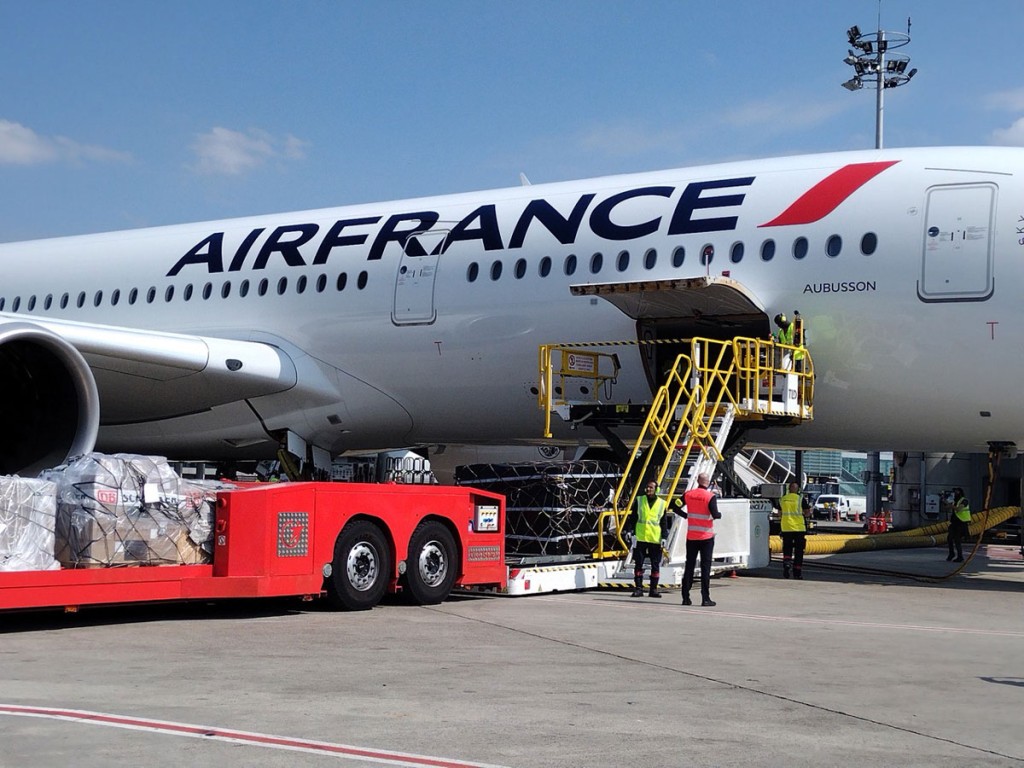Air France-KLM CO₂ emissions reduction targets for 2030 approved by the Science Based Targets initiative (SBTi)
Dec 02, 2022- Air France-KLM commits to a 30% reduction per revenue tonne-kilometer of its well-to-wake jet fuel greenhouse gas emissions by 2030 compared to 2019, the benchmark year of reference.
- The SBTi has agreed that Air France-KLM 2030 emissions reduction targets are in line with the “well-below 2°C” objective, consistent with the Paris agreement.
- The decision marks an important milestone in Air France-KLM Group’s sustainability roadmap, defined with clear and actionable levers to reach its 2030 CO₂ reduction targets

The Air France-KLM Group and its airlines are committed to reducing their environmental footprint as part of a transparent and responsible approach to sustainability, including a commitment by Air France-KLM to reduce its well-to-wake scope 1 and 3 jet fuel greenhouse gas protocol emissions by 30% per revenue tonne kilometre (RTK) by 2030 compared to 2019. In that context, the Air France-KLM Group, Air France Group and KLM have submitted their CO₂ emissions reduction targets, and they have recently been approved by the SBTi’s Target Validation Team. The SBTi has approved the Group’s scope 1 and scope 3 emissions reduction targets and has confirmed that they are in line with a well-below 2°C objective, as determined by the Paris Agreement signed in 2015.
“The Group designed a consistent approach, developed within the Group’s Destination Sustainability strategy, with the goal of CO₂ emissions reduction based on three main pillars: fleet renewal, sustainable aviation fuel, operational measures,” said Benjamin Smith, CEO of the Air France-KLM Group. “The SBTi targets approval is a key element for the Group to ensure that Air France-KLM decarbonization strategy is consistent with scientific objectives.”
“Faced with the climate emergency, alongside all airlines in the Air France-KLM Group, Air France is taking responsibility and is fully committed to reducing its carbon footprint,” said Anne Rigail, CEO of Air France. “This year, we created a tailor-made strategy called Air France ACT, based on four pillars: the accelerated renewal of our fleet, the progressive utilization of SAF beyond French and European mandates, the development of eco-responsible piloting and the deployment of intermodality through our reinforced cooperation with train operators. The approval of our 2030 CO2 emissions reduction by the SBTi confirms the robustness of our decarbonization roadmap, and we will continue to transparently share our actions and results with our customers and the general public.”
“Together with Air France-KLM and Air France, KLM has strong ambitions when it comes to making aviation more sustainable and balancing the development of our network with the environment,” said Marjan Rintel, CEO KLM. “This requires fundamental decisions regarding our fleet, our operations, and our fuel use. The Science Based Targets and the associated CO2 reduction direction provides clarity and, at the same time, entails major challenges. To make them feasible, we work closely with each other and with our sector partners to develop technical solutions and innovations that support the energy transition in aviation.”
Destination Sustainability, the Air France-KLM Group’s sustainability program
The Air France-KLM Group is committed to reducing the environmental impact of its activities. To do so, the Group has established a decarbonization objective based on three main levers aggregated within the ‘Destination Sustainability’ program.
These levers are as follows:
- An ambitious plan to modernize and renew the fleets of Group airlines with latest-generation aircraft, emitting 20-25% less CO₂ compared to their predecessors. With the objective of having 64% of new generation aircraft in the Group’s fleet by 2028, the Group is currently investing over €2 billion annually for the acquisition of Airbus A220s, Airbus A320- and A321neos, Airbus A350s, Boeing 787s, and Embraer 195-E2s, which are amongst the most efficient aircraft in their respective categories.
- The use of Sustainable Aviation Fuels (SAF). These non-fossil fuels can be produced from industrial or domestic waste in a circular economy, and the SAF sourced by Air France-KLM does not compete with the human food chain or with animal feed. Air France and KLM have been pioneers in the use of these alternative fuels, which will play a key role in the decarbonization of air transport, as they can reduce CO₂ emissions up to 80% over their life cycle. In that respect, two off-take agreements were signed in November 2022 enabling the Group to secure 3% out of the 10% 2030 SAF incorporation objective.
- The improvement of operational efficiency, by favoring more direct objectives and applying procedures that limit fuel consumption (single-engine taxi, continuous descent, etc.).
In addition, Air France-KLM is working with the broader aviation sector to accelerate the development of innovative solutions for aircraft design and maintenance, engines, and synthetic fuels, which are required to reach net zero emissions in aviation.
*SBTI, a scientific approach in line with the Paris agreement
The Science Based Targets initiative (SBTi) is a global body enabling businesses to set ambitious emissions reduction targets in line with the latest climate science.
The initiative is a collaboration between the Carbon Disclosure Project (CDP), the United Nations Global Compact, the World Resources Institute (WRI), and the World Wide Fund for Nature (WWF). The SBTi independently assesses and validates companies’ CO₂ emissions targets based on a scientific approach and criteria.
Similar Stories

A flying start to 2025 but after 14 months of double-digit demand growth, air cargo stakeholders remain cautious
View ArticlePharma.Aero expands global network with six key new members
CEVA Logistics, Skandi Network, SCL Cold Chain, Shipex NV, Pharming Group, and ARTBIO join the life sciences logistics collaborative platform
View Article
Chapman Freeborn appoints Bolton-Wilson VP Humanitarian and Government
View Article
Alleima supplies Preem in the green transition of the aviation industry
View Article
Airforwarders Association new board member King elected
View Article
Air India extends SATS and WFS partnership with 14 new cargo and ground handling contracts across global network
View ArticleGet the most up-to-date trending news!
SubscribeIndustry updates and weekly newsletter direct to your inbox!





